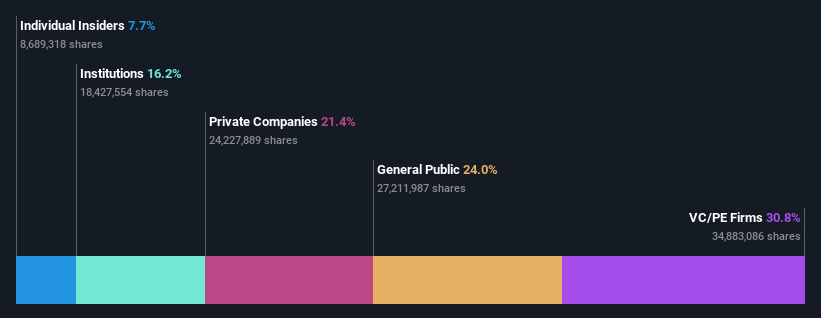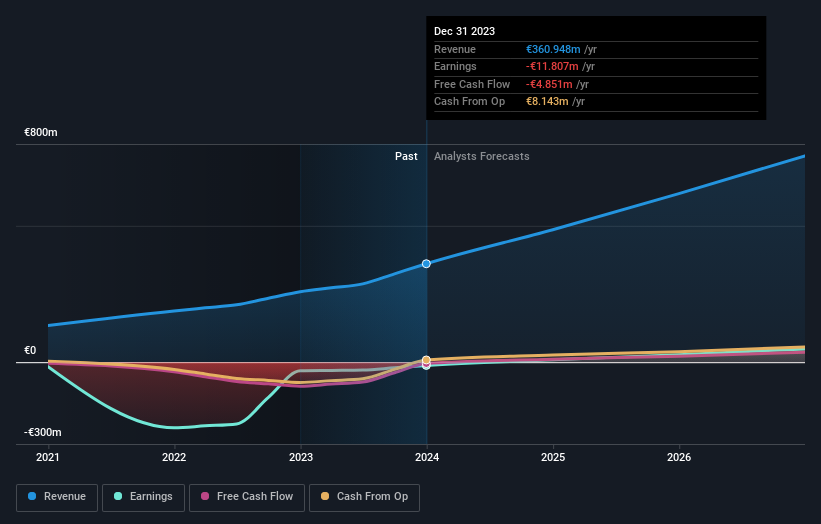tonies SE's (FRA:TNIE) market cap surged €70m last week, private equity firms who have a lot riding on the company were rewarded

Key Insights
- tonies' significant private equity firms ownership suggests that the key decisions are influenced by shareholders from the larger public
- The top 4 shareholders own 52% of the company
- 16% of tonies is held by Institutions
A look at the shareholders of tonies SE (FRA:TNIE) can tell us which group is most powerful. And the group that holds the biggest piece of the pie are private equity firms with 31% ownership. That is, the group stands to benefit the most if the stock rises (or lose the most if there is a downturn).
As a result, private equity firms collectively scored the highest last week as the company hit €703m market cap following a 10% gain in the stock.
Let's take a closer look to see what the different types of shareholders can tell us about tonies.
View our latest analysis for tonies

What Does The Institutional Ownership Tell Us About tonies?
Many institutions measure their performance against an index that approximates the local market. So they usually pay more attention to companies that are included in major indices.
tonies already has institutions on the share registry. Indeed, they own a respectable stake in the company. This suggests some credibility amongst professional investors. But we can't rely on that fact alone since institutions make bad investments sometimes, just like everyone does. It is not uncommon to see a big share price drop if two large institutional investors try to sell out of a stock at the same time. So it is worth checking the past earnings trajectory of tonies, (below). Of course, keep in mind that there are other factors to consider, too.

tonies is not owned by hedge funds. Armira Beteiligungen GmbH & Co. KG is currently the company's largest shareholder with 31% of shares outstanding. Meanwhile, the second and third largest shareholders, hold 9.5% and 6.2%, of the shares outstanding, respectively.
On looking further, we found that 52% of the shares are owned by the top 4 shareholders. In other words, these shareholders have a meaningful say in the decisions of the company.
While it makes sense to study institutional ownership data for a company, it also makes sense to study analyst sentiments to know which way the wind is blowing. Quite a few analysts cover the stock, so you could look into forecast growth quite easily.
Insider Ownership Of tonies
The definition of company insiders can be subjective and does vary between jurisdictions. Our data reflects individual insiders, capturing board members at the very least. The company management answer to the board and the latter should represent the interests of shareholders. Notably, sometimes top-level managers are on the board themselves.
I generally consider insider ownership to be a good thing. However, on some occasions it makes it more difficult for other shareholders to hold the board accountable for decisions.
Our most recent data indicates that insiders own some shares in tonies SE. It has a market capitalization of just €703m, and insiders have €54m worth of shares, in their own names. It is good to see some investment by insiders, but it might be worth checking if those insiders have been buying.
General Public Ownership
With a 24% ownership, the general public, mostly comprising of individual investors, have some degree of sway over tonies. While this size of ownership may not be enough to sway a policy decision in their favour, they can still make a collective impact on company policies.
Private Equity Ownership
With a stake of 31%, private equity firms could influence the tonies board. Some investors might be encouraged by this, since private equity are sometimes able to encourage strategies that help the market see the value in the company. Alternatively, those holders might be exiting the investment after taking it public.
Private Company Ownership
Our data indicates that Private Companies hold 21%, of the company's shares. It's hard to draw any conclusions from this fact alone, so its worth looking into who owns those private companies. Sometimes insiders or other related parties have an interest in shares in a public company through a separate private company.
Next Steps:
It's always worth thinking about the different groups who own shares in a company. But to understand tonies better, we need to consider many other factors. Case in point: We've spotted 1 warning sign for tonies you should be aware of.
But ultimately it is the future, not the past, that will determine how well the owners of this business will do. Therefore we think it advisable to take a look at this free report showing whether analysts are predicting a brighter future.
NB: Figures in this article are calculated using data from the last twelve months, which refer to the 12-month period ending on the last date of the month the financial statement is dated. This may not be consistent with full year annual report figures.
New: Manage All Your Stock Portfolios in One Place
We've created the ultimate portfolio companion for stock investors, and it's free.
• Connect an unlimited number of Portfolios and see your total in one currency
• Be alerted to new Warning Signs or Risks via email or mobile
• Track the Fair Value of your stocks
Have feedback on this article? Concerned about the content? Get in touch with us directly. Alternatively, email editorial-team (at) simplywallst.com.
This article by Simply Wall St is general in nature. We provide commentary based on historical data and analyst forecasts only using an unbiased methodology and our articles are not intended to be financial advice. It does not constitute a recommendation to buy or sell any stock, and does not take account of your objectives, or your financial situation. We aim to bring you long-term focused analysis driven by fundamental data. Note that our analysis may not factor in the latest price-sensitive company announcements or qualitative material. Simply Wall St has no position in any stocks mentioned.
About DB:TNIE
tonies
Through its subsidiaries, develops, produces, and distributes audio systems in Germany, the United States, the United Kingdom, and internationally.
Flawless balance sheet with reasonable growth potential.
Market Insights
Community Narratives




